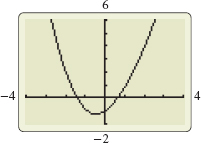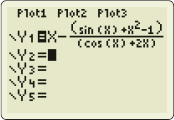EXAMPLE 6Using Technology with Newton’s Method
![]() The graph of the function f(x)=sinx+x2−1 is shown in Figure 14.
The graph of the function f(x)=sinx+x2−1 is shown in Figure 14.

- (a) Use the Intermediate Value Theorem to confirm that f has a zero in the interval (0,1).
- (b) Use graphing technology with Newton’s Method and a first approximation of c1=0.5 to find a fourth approximation to the zero.
Solution (a) The function f(x)=sinx+x2−1 is continuous on its domain, all real numbers, so it is continuous on the closed interval [0,1]. Since f(0)=−1 and f(1)=sin1≈0.841 have opposite signs, the Intermediate Value Theorem guarantees that f has a zero in the interval (0,1).
(b) We begin by finding f′(x)=cosx+2x. To use Newton’s Method with a graphing utility, we enter x−sinx+x2−1cosx+2xx−f(x)f′(x)
into the Y=editor, as shown in Figure 15. We create a table by entering the initial value 0.5 in the X column. The graphing utility computes 0.5−sin0.5+0.52−1cos0.5+2(0.5)=0.64410789
and displays 0.64411 in column Y1 next to 0.5. The value Y1 is the second approximation c2 that we use in the next iteration. That is, we enter 0.64410789 in the X column of the next row, and the new entry in column Y1 is the third approximation c3. We repeat the process until we obtain the desired approximation. The fourth approximation to the zero of f is 0.63673, as shown in Figure 16.
